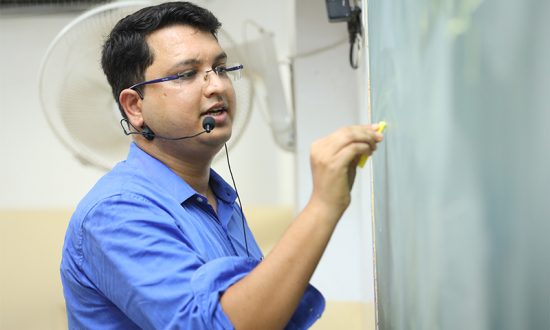Er. Nitin Vijay is counted as one of the most experienced faculty for Physics and also known for training the young minds for perfection in physics and finalizing them to face any type of exam papers. Keep in mind not to jump to problem-solving without mastering the concept and he is also known to clear all concepts of physics through his simple and logical skills.
There is no denying that the impact of global pandemic Coronavirus has put the world in a disturbing situation. It has affected every sector globally including education. Due to this in India, educational institutes have been shut affecting millions of school-going students and those who are pursuing higher education. The Central Government and all State Governments have worked aggressively to reduce the immediate effect of the national lockdown by maintaining the education regularity through remote learning.
With an aim to support and motivate the students at school & college level during this difficult phase, the government has come up with e-learning programs and most of the ed-tech brands have given their support to strengthen this by offering free online classes or discounts on e-learning modules. This advanced initiative has been met with immense response from the students and their parents. Thus, digital education came out as the most workable and trustworthy way to completely fill in the gap for teaching in the classroom until the pandemic ends. This has also initiated the earlier outlying issue for digital education in India.
Moving ahead digital learning is to be expected as a unified into normal education. Also, digital learning will give a great chance to teachers as they can come up with personalized learning solutions for each and every student. There are various advantages of Digital learning. Key benefits of this are as Digital learning has no physical boundaries; it gives good learning experience in comparison to traditional learning; it is cost-effective, and students get an opportunity to learn many things within their comfort zone.
At present, developing a complete infrastructure for digital learning by the Government seems to be difficult. Moreover, if the digital infrastructure in India is developed, first of all, the training has to be given to the teachers so that they can use digital systems effectively and can provide planned uninterrupted education. Remote learning’s dependency on the power supply and Internet connectivity might be an issue especially in Tier 2 and Tier 3 cities of India. Almost all educational institutes are using online video platforms to connect with the students. Here, the question again sticks in mind for the students living in rural areas as there is a problem of internet connectivity in many parts of the country, particularly in rural areas. Another major issue is that digital learning may see some dropout rate due to the lack of a study environment and the students may tend to have distractions such as social media, gaming, movies, etc.
It is not only just the question of implementing regular and uninterrupted education during the pandemic phase but also the most significant challenge for the teachers is to focus on the complete elements of a well-developed course. Developing a purposeful and well-defined online course, which supports the instructor and learner, means devoting appropriate time and embedding the applicable course elements into the e-learning environment. Through the use of technology, we can, if not provide a strong alternative to the conventional education system, mitigate and compensate for the impediments posed and inconvenience caused due to COVID 19 pandemic to the education system. Learning, as they say, is a continuous and ever-evolving process. The educational institutions in India, from schools to universities, can use this present adversity as a blessing in disguise and make digital education a major part of the learning process for all learners in the future.




